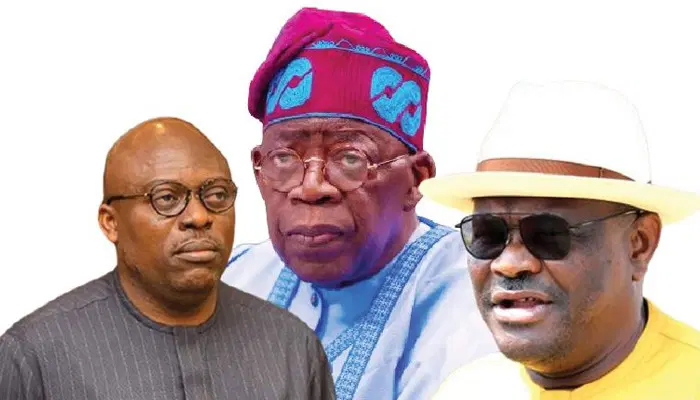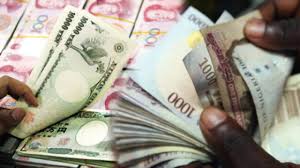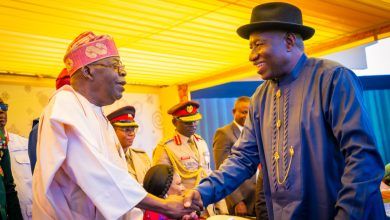
President Bola Tinubu declared a state of emergency in Rivers State on Tuesday evening, citing the need to restore law and order.
The announcement came in a nationwide broadcast, marking an extraordinary intervention in the state’s prolonged political crisis.
Tinubu suspended Governor Siminalayi Fubara, his deputy, Ngozi Odu, and all elected members of the Rivers State House of Assembly for an initial period of six months. To manage the state during the emergency, Tinubu appointed retired Vice Admiral Ibokette Ibas as the state administrator.
Within hours of the declaration, soldiers moved into the Rivers Government House in Port Harcourt. Eyewitnesses reported military personnel stationed outside the Governor’s residence, with an Armoured Personnel Carrier set up at the entrance to the seat of power. Sources confirmed that Governor Fubara was still inside the Government House at the time the military arrived.
The atmosphere in Port Harcourt was tense, as many residents rushed home upon hearing the news of the state of emergency. Discussions over the political developments became the talk of the town, with some residents voicing their displeasure over the situation.
In his broadcast, President Tinubu explained that the political situation in the state had deteriorated to the point where political solutions had failed, causing a stall in development and denying the people of Rivers State the benefits of democracy. He noted that Fubara and Odu had not formally requested his intervention, leading to his decision to invoke Section 305 of the 1999 Constitution.
Tinubu emphasized that the emergency rule would not affect the judicial arm of the state, which would continue to function as per the Constitution. He also clarified that while the appointed administrator would manage the state’s affairs, no new laws would be made, though the administrator could issue necessary regulations, subject to approval by the Federal Executive Council and promulgation by the President.
The declaration followed an emergency meeting called by the President with service chiefs and the Inspector-General of Police in response to escalating violence in the state, including a series of attacks on oil pipelines. Just hours before the emergency rule announcement, two separate explosions were reported at oil pipelines in Rivers State, fueling further concern over the growing instability.
In response to his suspension, Governor Fubara urged calm among the people of Rivers State, pledging to engage with all relevant institutions to uphold democracy and continue the development of the state. He blamed the political tensions on members of the state House of Assembly loyal to former Governor Nyesom Wike, who he claimed had frustrated his attempts to implement the Supreme Court’s judgment.
Political Crisis and Impeachment Moves
The political crisis in Rivers State has been brewing for months, stemming from a bitter standoff between Fubara, the state’s legislature, and factions loyal to Wike. The impasse escalated in October 2023 when Fubara’s administration demolished the state assembly building, preventing the opposition from holding sittings. Despite this, a Rivers State High Court later ruled that the 27 lawmakers who had opposed Fubara remained valid members of the Peoples Democratic Party (PDP).
The conflict intensified in February 2025 when the Supreme Court affirmed earlier rulings that declared Fubara’s actions against the assembly members unlawful. The court imposed a fine of N10 million on Fubara and ordered the resumption of the 27 lawmakers’ duties. Fubara pledged to comply with the judgment but faced mounting political pressure, including impeachment proceedings initiated by the state House of Assembly.
The Assembly, led by Martin Amaewhule, served Fubara and his deputy with notices of alleged misconduct on March 17, 2025. The move followed months of escalating tensions, which saw some Ijaw groups—loyal to the governor—threaten unrest if Fubara was impeached. They warned that such a move could destabilize the region, affecting oil production and exacerbating tensions in the Niger Delta.
Security Concerns and Federal Intervention
The President also referenced the rising security concerns in Rivers State, pointing to a series of militant attacks on oil infrastructure. Reports from security agencies indicated that militants had vandalized pipelines without the governor taking adequate action to address the issue. Tinubu said he had given stern orders to security forces to ensure the safety of citizens and oil installations.
The President expressed that the growing violence and political gridlock in Rivers State necessitated the intervention, citing the constitutional provision that allows for a state of emergency in times of national or regional crisis. He urged that the intervention would help restore order and ensure the well-being of Rivers State’s residents.
Opposition and Legal Challenges
The declaration of a state of emergency has been met with strong opposition. The Nigerian Bar Association (NBA) criticized the President’s decision, arguing that the 1999 Constitution does not grant the President the authority to remove elected officials under the guise of a state of emergency. The NBA insisted that the conflict in Rivers State did not constitute the type of breakdown in law and order required for emergency rule.
Former Vice President Atiku Abubakar also condemned the action, claiming it was politically motivated and part of a broader attempt to manipulate the situation in the state. He accused the President of failing to prevent the escalation of violence and called the declaration an “assault on democracy.”
The opposition Peoples Democratic Party (PDP) also rejected the move, stating that the President’s actions violated the Constitution and undermined the will of the people of Rivers State. They argued that the political tensions in the state should have been resolved through legal and constitutional channels, rather than through an executive fiat.
In conclusion, the declaration of a state of emergency in Rivers State marks the latest chapter in Nigeria’s ongoing political struggles. The situation remains fluid, and many eyes are now on the National Assembly to determine whether the declaration will be upheld.





